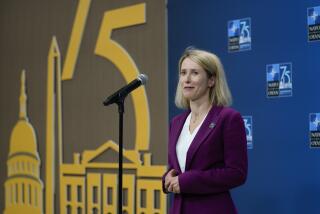President of Estonia Warns West of Russia : Baltics: Recent threats from Kremlin show Moscow is dangerous, leader of former Soviet Republic cautions.
- Share via
TALLINN, Estonia — In the dark days of Stalinist rule, young Lennart Meri went to bed every night with headphones from his makeshift shortwave radio clamped to his head and Western broadcasts buzzing in his ears.
“That radio was very important for me,” said Meri, now president of this pro-reform ex-Soviet republic. “It meant I was never stranded. I always knew what was going on in the world.”
But the 66-year-old president, polyglot, writer, film director and anthropologist is not listening to the world so much these days. He is too busy trying to get the world to listen to him.
What he has to say often boils down to a warning: that Russia, Estonia’s giant eastern neighbor, is more dangerous than the West seems prepared to believe.
In a message he has been spreading during a North American speaking and business tour that concludes in Los Angeles on Tuesday and Wednesday, Meri says the West may be making the same mistake it made in its early relations with Nazi Germany by handling Russia with kid gloves and offering aid without strict conditions.
“They thought that by feeding a tiger more and more meat, it would eventually turn into a vegetarian,” Meri said during a recent interview at his palace residence here in the Estonian capital. “It won’t happen.”
It is not only the bitter experience under 50 years of Moscow rule that worries Meri, a survivor of Siberian exile after the Soviet takeover of Estonia in 1940.
Recent threats from the Kremlin seem to give substance to his worst fears.
Moscow media have reported that Russia’s army has signed on to a doctrine calling for an invasion of Estonia and the other two Baltic nations, Latvia and Lithuania, should they ever achieve their cherished goal of joining NATO.
Russian President Boris N. Yeltsin has angrily denounced expansion of the North Atlantic Treaty Organization and suggested that it could trigger war throughout Europe.
Although Russia’s Foreign Ministry has played down the threats, Meri says Estonia takes them seriously.
It has to, he says, because it has more to lose if it turns out Russia is not bluffing.
“Small nations are always more sensitive about national security,” he said. “If things go wrong, it’s always us small nations that suffer most.”
Since becoming Estonia’s first president after independence in 1991, Meri has led a crusade to get all three Baltic states a seat in European security organizations.
Behind the scenes, many diplomats are urging the Baltic states to set their sights instead on European Union membership.
But Meri is adamant, arguing that any meaningful security requires full admission to both the EU trading bloc and NATO.
“If during the Cold War, the fate of Berlin became a litmus test for Western security, then the Baltic states play that role now,” Meri said.
But few Western leaders are likely to buy the argument that their security depends on three tiny nations. These leaders are not liable to feel that the Baltic states are worth the risk of provoking a still mighty, nuclear-armed Russia.
Meri says he knows that his nation must develop good relations with Moscow, but he shares the skepticism of those who say Russia does not have the political will or tradition to fully embrace democracy.
While admitting its fragility throughout the former Soviet Union, Meri insists that democracy has taken firm hold in his country. He points to a recent government crisis spurred by press revelations that one minister had bugged the offices of other political leaders.
“It showed that Estonians have adopted ways of thinking that are typical for a parliamentary democracy,” said Meri, who has no role in day-to-day politics and has remained popular and above the partisan fray.
And though the presidency has placed more demands on his time, friends say Meri can still be found at night huddled over a shortwave, spinning through the frequencies to find the latest news in English, French, German, Finnish--and Russian.
More to Read
Sign up for Essential California
The most important California stories and recommendations in your inbox every morning.
You may occasionally receive promotional content from the Los Angeles Times.













